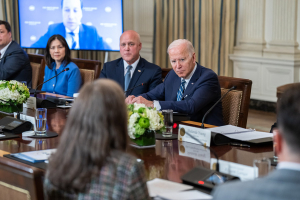joe-biden.jpg

Photo by The White House on Flickr.
Support migrant centric journalism today and donate

The US Supreme Court has ruled that President Joe Biden can end a controversial Trump-era US immigration policy. Biden has being trying to scrap the ‘Remain in Mexico’ policy since the start of his administration. The controversial scheme forces certain non-Mexican citizens who entered the US back to Mexico.
The policy was introduced as an alternative to detaining immigrants or releasing them into the United States while they awaited an outcome on US immigration proceedings. The Supreme Court ruled 5 – 4 in Biden’s favor, and stated that US immigration law gives the Biden administration discretion to end the controversial Remain in Mexico policy.
It’s understood that the case will now go back to the lower courts for additional proceedings around Biden’s latest attempts to end the program. A hold on Biden’s efforts to end the program currently remain in place, but following the Supreme Court’s ruling, the hold is expected to be lifted soon.
Relevant US immigration statute
Writing on behalf of the majority, Chief Justice John Roberts said: “The relevant US immigration statute plainly confers a discretionary authority to return aliens to Mexico during the pendency of their immigration proceedings.
“The use of the word ‘may’ in the law question, makes clear that contiguous-territory return is a tool that the (DHS) Secretary has the authority, but not the duty, to use,” Justice Roberts added.
The Supreme Court’s ruling is considered a major victory for the Biden administration’s US immigration agenda having suffered several losses in the lower courts in a bid to reverse many of Trump’s hardline US immigration policies.
Several of the red states that challenged the termination of Migrant Protection Protocols have also brought lawsuits challenging other attempts by Biden to move away from his predecessor’s aggressive approach and those cases are still working their way through lower courts.
Homeland Security welcomes ruling
The Supreme Court’s ruling has been well received by the US Department of Homeland Security (DHS).
In October 2021, a DHS statement said: “As Secretary Mayorkas concluded in October 2021 after a thorough review, the prior Administration’s Migrant Protection Protocols (MPP) has endemic flaws, imposes unjustifiable human costs, and pulls resources and personnel away from other priority efforts to secure our border.”
Following the Supreme Court’s decision, the DHS said: “We welcome the Supreme Court’s decision affirming that the Secretary has the discretionary authority to terminate the program, and we will continue our efforts to terminate the program as soon as legally permissible.”
In overseeing the case, Justice Roberts was joined by the liberal justices and Justice Brett Kavanaugh, with Kavanaugh also filing a concurring opinion. Justices Samuel Alito and Amy Coney Barrett wrote dissenting opinions, joined by the other dissenters.
State lawsuits
Following the ruling, the Supreme Court said that the lower courts must now determine whether the Biden administration complied with administrative law with the more recent attempt that was made to end the Remain in Mexico policy – with a memo rolled out in October.
Biden’s efforts to scrap the program have been challenged in court by a coalition of red states led by Texas, which argued that ending it ran contrary to US immigration law.
The states also argued that the Biden administration violated the Administrative Procedure Act, which requires that agencies take certain procedural steps when implementing policy, in how it went about unwinding Migrant Protection Protocols.
The lower courts, which refused to consider the October memo, will now assess whether that latest attempt to end the program complied with the Administrative Procedure Act.
Roberts wrote: “The government’s authority to release some migrants on parole, rather than detain them or send them back to Mexico, is not unbounded.” He also noted US immigration law’s requirement that parole be used ‘on a case-by-case basis.’
“And under the APA, (the Department of Homeland Security’s) exercise of discretion within that statutory framework must be reasonable and reasonably explained,” Roberts added.
In Roberts’ opinion, the lower court got it wrong when blocking Biden’s termination of the program, citing a court ruling from earlier this term that said ‘lower courts could not grant class-wide orders that barred US immigration officials from carrying out certain policies’.
Robert’s comments suggest that the lower courts, in the next round of litigation over ‘Remain in Mexico,’ will have no authority to block Biden’s attempts to end the program, but it was not immediately clear whether the administration can end the policy immediately.
Lower court authority
Meanwhile, the justices’ holding on lower court authority may also hinder future efforts to challenge in court the immigration policies of Democratic and Republican administrations - meaning that immigrant rights activists may have secured a short-term victory with the Supreme Court’s, ruling while suffering a longer-term setback.
Aaron Reichlin-Melnick, policy director of the American Immigration Council, said in a statement: “While we are heartened that today’s decision will end the cruel and inhumane Remain in Mexico program, stripping federal courts of their ability to issue injunctions in immigration enforcement and detention cases not brought by individual immigrants will have severe ramifications on immigrant rights going forward.”
“Limiting access to justice to challenge immigration enforcement cases sets a dangerous precedent by giving agencies unchecked power to arrest, detain, and deport,” Melnick added.
The Remain in Mexico program, which was first implemented in 2019 under then-President Donald Trump, has been criticized by immigrant-rights advocates, who argue that it’s inhumane and that it exposes asylum seekers with credible claims to dangerous and squalid conditions in Mexico.
Prior to the Trump administration putting the ‘Remain in Mexico’ program in place, no other administration had embraced such an approach toward non-Mexican asylum-seekers that required them to stay in Mexico over the course of their US immigration court proceedings in the United States.
Biden campaigned to end the policy, saying that it ‘goes against everything we stand for as a nation of immigrants’.
Biden has struggled to contain a growing number of border crossings over the course of his administration amid mass migration in the Western hemisphere.
Since October, US border authorities have encountered migrants more than a million times along the US-Mexico border, though many have been turned away under a separate pandemic-emergency rule known as Title 42.
The Department of Homeland Security, though, has maintained that the ‘Remain in Mexico’ policy comes at a high human cost and is not an effective use of resources.
Immigrant rights advocates celebrated the Supreme Court’s ruling.
Judy Rabinovitz, special counsel with the ACLU’s Immigrants’ Rights Project, said in a statement that, with the case returning to lower court, the Biden administration “can and should move forward swiftly to finally terminate ‘Remain in Mexico’ for good - a result that has been long, and unjustly, delayed.”
According to the Biden Justice Department, the relevant US immigration law had never before been interpreted as requiring the government to send migrants back to Mexico with pending immigration proceedings that it was unable to hold in detention.
“Every presidential administration has understood this to just be a purely discretionary authority. That goes for the prior administration,” Solicitor General Elizabeth Prelogar said at oral arguments in April.
She also argued that keeping ‘Remain in Mexico’ in force would not solve the essential problem - that Congress has instructed that US immigration officials ‘shall’ detain asylum seekers whose proceedings are pending but that lawmakers have failed to appropriate sufficient resources for those detention facilities.
Workpermit.com can help with US employment-based visas
If you would like to apply for a US work visa – including L1 visas, E2 visas, O1 visas and H1B visas - Workpermit.com can help.
Workpermit.com is a specialist visa services firm with over thirty years of experience dealing with visa applications. We can help with a wide range of visa applications to your country of choice. Contact us for further details. You can also telephone 0344 991 9222.




















